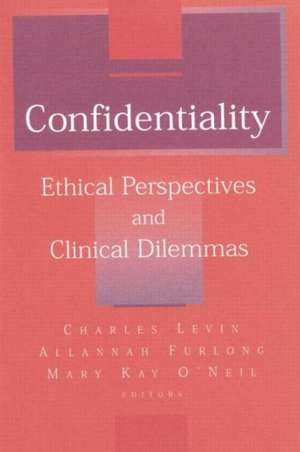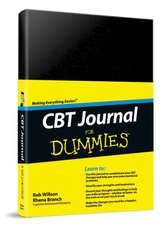Confidentiality: Ethical Perspectives and Clinical Dilemmas
Autor Charles D Levin, Allanah Furlong, Mary Kay O'Neilen Limba Engleză Paperback – 9 iun 2014
In wrestling with these questions, the contributors to Confidentiality are responding to a professional, ethical, and political crisis in the field of mental health. Psychotherapy - especially long-term psychotherapy in its psychoanalytic variants - has been undermined by an erosion of personal privacy that has become part of our cultural zeitgeist. The heightened demand for public transparency has forced caregivers from all walks of professional life to submit to increasing bureaucratic regulation.
For the contributors to this collection, the need for confidentiality is centrally involved in the relationship of the psychotherapeutic professions both to society and to the law. No less importantly, the requirement of confidentiality brings a clarifying perspective to debates within the psychotherapeutic literature about the relationship of theory to practice. It thereby provides a framework for shaping a set of ethical principles specifically adapted to the psychotherapeutic, and especially to the psychoanalytic, relationship.
Linking general issues of privacy to the intimate details of psychotherapeutic encounter, Confidentiality will serve as a basic guide to a wide range of professionals, including lawyers, social scientists, philosophers, and, of course, psychotherapists. Therapy patients, policy makers, and the wider public will also find it instructive to know more about the special protected conditions under which one can better come to "know thyself."
Preț: 181.77 lei
Preț vechi: 349.36 lei
-48% Nou
Puncte Express: 273
Preț estimativ în valută:
34.79€ • 36.18$ • 28.72£
34.79€ • 36.18$ • 28.72£
Carte tipărită la comandă
Livrare economică 14-28 aprilie
Preluare comenzi: 021 569.72.76
Specificații
ISBN-13: 9781138005679
ISBN-10: 1138005673
Pagini: 350
Dimensiuni: 152 x 229 x 23 mm
Greutate: 0.48 kg
Ediția:1
Editura: Taylor & Francis
Colecția Routledge
Locul publicării:Oxford, United Kingdom
ISBN-10: 1138005673
Pagini: 350
Dimensiuni: 152 x 229 x 23 mm
Greutate: 0.48 kg
Ediția:1
Editura: Taylor & Francis
Colecția Routledge
Locul publicării:Oxford, United Kingdom
Public țintă
ProfessionalCuprins
Part I: Thinking About Confidentiality. Lea, Confidentiality as a Virtue. Forrester, Trust, Confidentiality, and the Possibility of Psychoanalysis. Modell, Having a Thought of One's Own. Furlong, The Why of Sharing and Not the What: Confidentiality and Psychoanalytic Purpose. Levin, Civic Confidentiality and Psychoanalytic Confidentiality. Part II: Dilemmas in Treatment, Research, and Training. Kernberg, Some Reflections on Confidentiality in Clinical Practice. Galatzer-Levy, Psychoanalytic Research and Confidentiality: Dilemmas. Britton, Confidentiality and Training Analyses. Michels, Confidentiality, Reporting, and Training Analyses. O'Neil, Confidentiality, Privacy, and the Psychoanalytic Career. Part III: Clinical Practice. Tomlinson, The Early History of the Concept of Confidentiality in Psychoanalysis. da Silva, Confidentiality in Psychoanalysis: A Private Space for Creative Thinking and the Work of Transformation. Garvey, Whose Notes Are They Anyway? Sundelson, Outing the Victim: Breeches of Confidentiality in an Ethics Procedure. Part IV: Professional Ethics and the Law. Bollas, Confidentiality and Professionalism. Freebury, Psychoanalytic Ethics: Has the Pendulum Swung Too Far? Mosher, We Have Met the Enemy and He (Is) Was Us. Pyles, The American Psychoanalytic Association's Fight for Privacy. Shuman, Legal Boundaries on Conceptions of Privacy: Seeking Therapeutic Accord. L'Heureux-Dub, The Right to Privacy: A Comment on the Production of Complainants' Personal Records in Sexual-Assault Cases. Hayman, A Psychoanalyst Looks at the Witness Stand.
Recenzii
"...this book deserves to reach all therapists, not just those committed to a single school of thought....this volume is recommended as urgent reading for all psychotherapists who are troubled by the erosion of supposedly confidential communications in their professional work."
- Psychotherapy: Theory, Research, Practice, Training
"This excellent collection of thoughtful essays examines in depth the role of confidentiality in psychoanalysis. It addresses a set of issues that range from the clinical relationship and the privacy of the self to the intersection of psychoanalytic practice with its social and cultural surround. More than an ethical or legal treatise, this book shows confidentiality to be, in the editors' words, 'a complex form of professional practice that links privacy and freedom of thought with the heart and essential methodology of the psychoanalytic encounter.'"
- Howard B. Levine, M.D., Chair, Joint Committee on Confidentiality, American Psychoanalytic Association
"Only rarely does a conference metamorphose into an outstanding book. Confidentiality has made that journey. It shows how analysts experience, and mediate among, conflicting obligations to patients, supervisors, and students, to research and to writing. This book is not only about confidentiality but also about conundrums that inhere in the psychoanalytic endeavor. I feared it would be a dry read, but it turned out to be juicy, pleasurable, and informative."
- Ethel Spector Person, M.D., Training and Supervising Analyst, Columbia University Center for Psychoanalytic Training and Research
"The subject of confidentiality is a topic that is always current and relevant. The strength of the book lies in the presentation of the broad perspective and the associated ethical perspectives that are often overlooked but are nonetheless relevant. In addition, the reader is reminded of the clinical confidentiality dilemmas that often accompany psychotherapy irrespective of the theoretical framework utilized by the therapist."
- Martha Barham, R.N., Ph.D., in American Journal of Clinical Hypnosis
"...this book deserves to reach all therapists, not just those committed to a single school of thought....this volume is recommended as urgent reading for all psychotherapists who are troubled by the erosion of supposedly confidential communications in their professional work."
—Psychotherapy: Theory, Research, Practice, Training
"This excellent collection of thoughtful essays examines in depth the role of confidentiality in psychoanalysis. It addresses a set of issues that range from the clinical relationship and the privacy of the self to the intersection of psychoanalytic practice with its social and cultural surround. More than an ethical or legal treatise, this book shows confidentiality to be, in the editors' words, 'a complex form of professional practice that links privacy and freedom of thought with the heart and essential methodology of the psychoanalytic encounter.'"
—Howard B. Levine, M.D
Chair, Joint Committee on Confidentiality, American Psychoanalytic Association
"Only rarely does a conference metamorphose into an outstanding book. Confidentiality has made that journey. It shows how analysts experience, and mediate among, conflicting obligations to patients, supervisors, and students, to research and to writing. This book is not only about confidentiality but also about conundrums that inhere in the psychoanalytic endeavor. I feared it would be a dry read, but it turned out to be juicy, pleasurable, and informative."
—Ethel Spector Person, M.D
Training and Supervising Analyst, Columbia University Center for Psychoanalytic Training and Research
- Psychotherapy: Theory, Research, Practice, Training
"This excellent collection of thoughtful essays examines in depth the role of confidentiality in psychoanalysis. It addresses a set of issues that range from the clinical relationship and the privacy of the self to the intersection of psychoanalytic practice with its social and cultural surround. More than an ethical or legal treatise, this book shows confidentiality to be, in the editors' words, 'a complex form of professional practice that links privacy and freedom of thought with the heart and essential methodology of the psychoanalytic encounter.'"
- Howard B. Levine, M.D., Chair, Joint Committee on Confidentiality, American Psychoanalytic Association
"Only rarely does a conference metamorphose into an outstanding book. Confidentiality has made that journey. It shows how analysts experience, and mediate among, conflicting obligations to patients, supervisors, and students, to research and to writing. This book is not only about confidentiality but also about conundrums that inhere in the psychoanalytic endeavor. I feared it would be a dry read, but it turned out to be juicy, pleasurable, and informative."
- Ethel Spector Person, M.D., Training and Supervising Analyst, Columbia University Center for Psychoanalytic Training and Research
"The subject of confidentiality is a topic that is always current and relevant. The strength of the book lies in the presentation of the broad perspective and the associated ethical perspectives that are often overlooked but are nonetheless relevant. In addition, the reader is reminded of the clinical confidentiality dilemmas that often accompany psychotherapy irrespective of the theoretical framework utilized by the therapist."
- Martha Barham, R.N., Ph.D., in American Journal of Clinical Hypnosis
"...this book deserves to reach all therapists, not just those committed to a single school of thought....this volume is recommended as urgent reading for all psychotherapists who are troubled by the erosion of supposedly confidential communications in their professional work."
—Psychotherapy: Theory, Research, Practice, Training
"This excellent collection of thoughtful essays examines in depth the role of confidentiality in psychoanalysis. It addresses a set of issues that range from the clinical relationship and the privacy of the self to the intersection of psychoanalytic practice with its social and cultural surround. More than an ethical or legal treatise, this book shows confidentiality to be, in the editors' words, 'a complex form of professional practice that links privacy and freedom of thought with the heart and essential methodology of the psychoanalytic encounter.'"
—Howard B. Levine, M.D
Chair, Joint Committee on Confidentiality, American Psychoanalytic Association
"Only rarely does a conference metamorphose into an outstanding book. Confidentiality has made that journey. It shows how analysts experience, and mediate among, conflicting obligations to patients, supervisors, and students, to research and to writing. This book is not only about confidentiality but also about conundrums that inhere in the psychoanalytic endeavor. I feared it would be a dry read, but it turned out to be juicy, pleasurable, and informative."
—Ethel Spector Person, M.D
Training and Supervising Analyst, Columbia University Center for Psychoanalytic Training and Research
Notă biografică
Mary Kay O'Neil, Charles D. Levin, Allanah Furlong
Descriere
The distinguished contributors to Confidentiality probe the ethical, legal, and clinical implications of a deceptively simple proposition: Psychoanalytic treatment requires a confidential relationship between analyst and analysand. But how, they a













